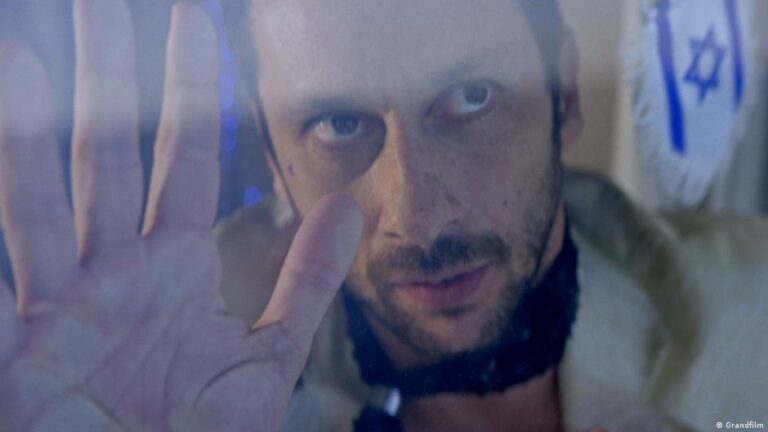Israeli filmmaker Nadav Lapid gained international renown by exploring his home country’s ills in films such as “Synonyms,” which won the Golden Bear in Berlin in 2019, and in “Ahed’s Knee,” which took Cannes’ Jury Prize two years later.
He had sworn to himself that his next film would not be about Israel.
His script titled “Yes” was ready to go into pre-production; he was already considering potential Hollywood actors to star in the lead roles of two artists who sell their art, souls and bodies to the rich and powerful.
But then October 7, 2023 happened.
The Israeli filmmaker, who lives in Paris, returned to his home country shortly after the Hamas terrorist attacks. He felt deep empathy for his family’s and friends’ state of agony, but he could also predict, based on the language used by politicians at the time, that the state’s revenge would take on “biblical proportions,” as he said at the Berlin premiere of his film, which now hits cinemas in Germany.
Lapid modified his script within a few weeks to reflect the unfolding events. “The film was happening all around me,” he said.
‘Responding to madness with madness’
The resulting work serves as a witness to a specific moment in history, the filmmaker says. At the same time, it’s a “fiction film on steroids”; a work that “responds to madness with madness,” as Lapid describes it.
But even the most satirical and experimental scenes — such as a high-ranking official’s head turning into a video player showing the horrors of war — feel like “a neo-realist film” to Israelis, says the filmmaker.
Meanwhile, no computer-generated imagery was needed to evoke what is happening in Gaza; a sequence of real images of the Palestinian enclave under bombardment is shown in the background as two Israelis make out from a hilltop next to the border.
Such scenes were shot without permit, and the entire production was filmed under the radar, says Lapid. He had difficulty finding a cast and crew who were willing to work on the film.
The lead actor, Ariel Bronz, is a provocative performance artist who made headlines some years ago for having put an Israeli flag up his buttocks during a show on freedom of speech.
Even though “Yes” was in part funded by the Israeli state, the country’s main distributors refused to take on the film, including the one who had distributed Lapid’s previous movies. “They didn’t even want to watch this one,” says Lapid.
For now, it has been screened at the Jerusalem Film Festival, and an independent release is being planned for Israel.
When a selfish elite supports nationalist ideology
Y. and Jasmine, the lead characters of “Yes,” are struggling artists by day and debauched entertainers by night. Their act is an insider’s tip shared by Tel Aviv’s ultra-rich: Hire the couple to perform amid your select guests, cocktails and artworks, and your party will turn into an orgiastic event, pulsing to Eurotrash beats.
One of the artworks appearing in the opening sequence’s party is George Grosz’s “Pillars of Society” (1926), a painting that portrays Germany’s elite as grotesque and selfish supporters of nationalism.
Through his satire, Grosz offered an early verdict on the state of Germany’s institutions, prophetically predicting how the support of corrupt and hypocritical institutions would pave the way for the rise of Nazism and a future of unparalleled destruction.
“The painting was the genesis of the film,” the Israeli director told DW. Nadav Lapid recalls being obsessed by the artwork as a young child, and points out that the painting’s style informs his vision of cinema, which he describes as “modern expressionism.”
And for him, “you don’t need a Nobel Prize” to see the parallels between the pillars of German society in 1926 and Tel Aviv’s elite, nearly a century later.
That statement applies to many scenes in the film. Lapid integrates unambiguous symbols and imagery in “Yes,” reflecting his view that nuances have simply disappeared from the Israeli discourse.
Rampant nationalism can be felt by the omnipresence of Israeli flags at every public event. And the submissive Y. literally licks the boots of his wealthy patron, an oligarch who commissions the musician to write a new powerful hymn for post-war Israel.
An incendiary video as the film’s centerpiece
The resulting anthem composed by Y. is revealed through a video of Israeli children casually singing lyrics that predict a genocide in Gaza within a year: “In another year, there will be nothing there” and “We will annihilate them all.”
There’s a troubling real-life backstory to the anthem. That video was actually released in November 2023, by a PR firm run by Ofer Rosenbaum, founder of the “The Civilian Front Movement,” which claims on its website to be “apolitical,” and whose stated goal is to restore support for the Israeli army. Under the title ”Friendship Song 2023,” it sets new lyrics to a canonic song by Israeli poet Haim Gouri, “Hareut” (1949), which is often performed at memorial ceremonies in Israel, as it commemorates fallen soldiers and friends.
The PR video, which is included in “Yes,” was widely shared on social media, and was even posted (and later removed) by Israeli state-owned TV channel, Kan.
Lapid openly admits that his proposition in “Yes” is more radical than any petition by pro-Palestinian organizations.
The filmmaker points out that long before international experts started accusing Israel of committing a genocide, he had already written into his script, in November 2023, that the “national anthem of Israel is genocide” — as a symbol of the “musical essence of the people,” he told DW.
He is well aware that only an Israeli could credibly put forward such a radical argument: “I dig into this collective soul, which is also mine.”
Edited by: Brenda Haas and Felix Tamsut


